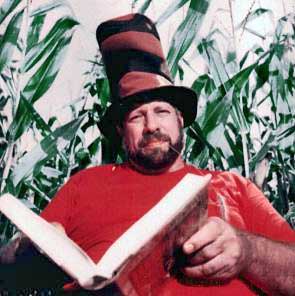
Michael Hart, the inventor of the e-book and the founder of Project Gutenberg, passed away this week at his home in Urbana, Illinois. He was 64. Project Gutenberg has published an obituary, as have most major newspapers. That's not surprising: his impact on the Internet and his vision of a future of open accessible content are profoundly important.
The impetus for Project Gutenberg came from time Hart spent operating the Xerox Sigma V mainframe at the University of Illinois back in the early Seventies. Access to such computing power was a huge opportunity, something that Hart wanted to make the most of:
"I happened to stop at our local IGA grocery store on the way. We were just coming up on the American Bicentennial and they put faux parchment historical documents in with the groceries. So, as I fumbled through my backpack for something to eat, I found the US Declaration of Independence and had a lightbulb moment. I thought for a while to see if I could figure out anything I could do with the computer that would be more important than typing in the Declaration of Independence, something that would still be there 100 years later, but couldn't come up with anything, and so Project Gutenberg was born."
It was a prescient move, and as he once told BoingBoing's Mark Frauenfelder, he suspected that "twenty or 30 years from now, there's going to be some gizmo that kids carry around in their back pocket that has everything in it -- including our books, if they want." Forty years after he digitized that copy of the Declaration of Independence, Project Gutenberg now houses some 36,000 titles -- books taken from the public domain, digitized, and made freely and openly available. And, as the futurist Hart predicted, we have devices with which we can download, store, carry in our pockets, and yes, read the entire Project Gutenberg catalog.
It's impossible to exaggerate the significance of this. To be sure, the books that you'll find in Project Gutenberg -- books like Jane Eyre, Pride and Prejudice, Ulysses, and The Tale of Two Cities (I could go on) -- are available in libraries. You can buy them from a bookstore, in both print and digital versions. But as they're in the public domain, no publisher or author holds the rights to the material. And unlike many of the e-books you buy, Project Gutenberg offers its digital texts in a variety of file formats. In other words, you're not stuck with a title that you can only read on your Kindle. You can read the books on your computer, on your Kindle, on your iPad, on your cellphone. You can, if you choose, print them out and read them on paper.
In digitizing books from the public domain, Project Gutenberg has become a great resource for literature and for literacy, and it is a cornerstone for other open educational resources on the Web.

